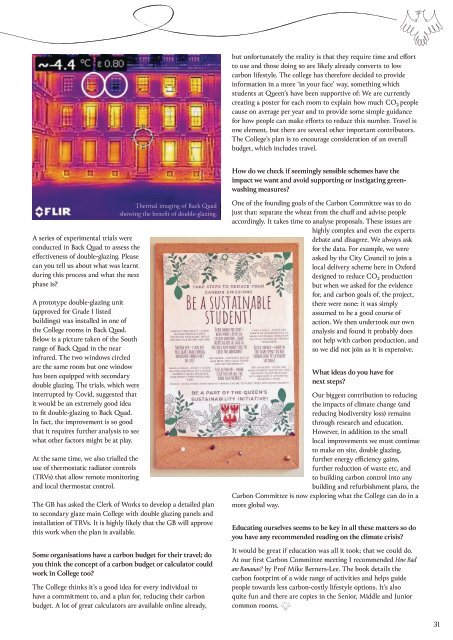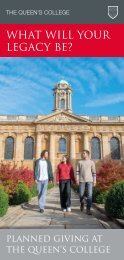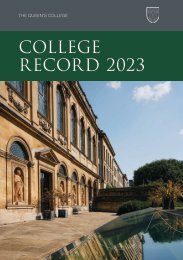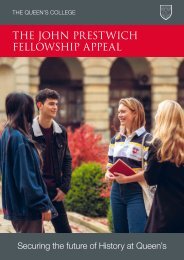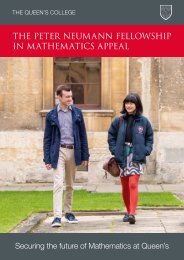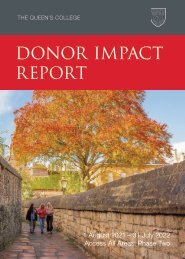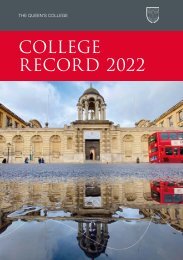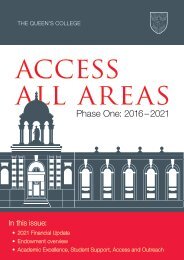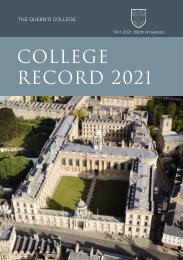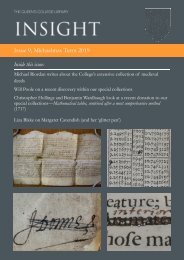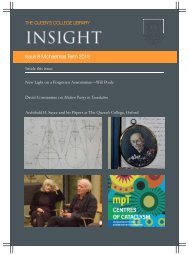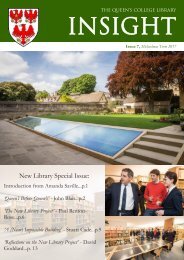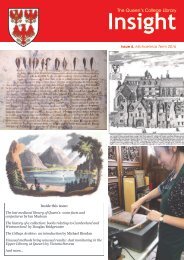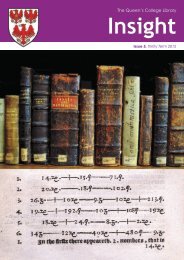Eagle Eye Magazine Issue 1 2023
Take a dive into the research and work that's going on at The Queen's College and beyond its walls within the community of Old Members. In issue one, we celebrate Shakespeare's First Folio, ask our history Fellows what makes them passionate about their subject, explore the new accessible Porters' Lodge, ask a current student about how to engage positively with climate issues, and much more.
Take a dive into the research and work that's going on at The Queen's College and beyond its walls within the community of Old Members. In issue one, we celebrate Shakespeare's First Folio, ask our history Fellows what makes them passionate about their subject, explore the new accessible Porters' Lodge, ask a current student about how to engage positively with climate issues, and much more.
Create successful ePaper yourself
Turn your PDF publications into a flip-book with our unique Google optimized e-Paper software.
ut unfortunately the reality is that they require time and effort<br />
to use and those doing so are likely already converts to low<br />
carbon lifestyle. The college has therefore decided to provide<br />
information in a more ‘in your face’ way, something which<br />
students at Queen’s have been supportive of: We are currently<br />
creating a poster for each room to explain how much CO 2 people<br />
cause on average per year and to provide some simple guidance<br />
for how people can make efforts to reduce this number. Travel is<br />
one element, but there are several other important contributors.<br />
The College’s plan is to encourage consideration of an overall<br />
budget, which includes travel.<br />
A series of experimental trials were<br />
conducted in Back Quad to assess the<br />
effectiveness of double-glazing. Please<br />
can you tell us about what was learnt<br />
during this process and what the next<br />
phase is?<br />
A prototype double-glazing unit<br />
(approved for Grade I listed<br />
buildings) was installed in one of<br />
the College rooms in Back Quad.<br />
Below is a picture taken of the South<br />
range of Back Quad in the near<br />
infrared. The two windows circled<br />
are the same room but one window<br />
has been equipped with secondary<br />
double glazing. The trials, which were<br />
interrupted by Covid, suggested that<br />
it would be an extremely good idea<br />
to fit double-glazing to Back Quad.<br />
In fact, the improvement is so good<br />
that it requires further analysis to see<br />
what other factors might be at play.<br />
At the same time, we also trialled the<br />
use of thermostatic radiator controls<br />
(TRVs) that allow remote monitoring<br />
and local thermostat control.<br />
Thermal imaging of Back Quad<br />
showing the benefit of double-glazing.<br />
The GB has asked the Clerk of Works to develop a detailed plan<br />
to secondary glaze main College with double glazing panels and<br />
installation of TRVs. It is highly likely that the GB will approve<br />
this work when the plan is available.<br />
Some organisations have a carbon budget for their travel; do<br />
you think the concept of a carbon budget or calculator could<br />
work in College too?<br />
The College thinks it’s a good idea for every individual to<br />
have a commitment to, and a plan for, reducing their carbon<br />
budget. A lot of great calculators are available online already,<br />
How do we check if seemingly sensible schemes have the<br />
impact we want and avoid supporting or instigating greenwashing<br />
measures?<br />
One of the founding goals of the Carbon Committee was to do<br />
just that: separate the wheat from the chaff and advise people<br />
accordingly. It takes time to analyse proposals. These issues are<br />
highly complex and even the experts<br />
debate and disagree. We always ask<br />
for the data. For example, we were<br />
asked by the City Council to join a<br />
local delivery scheme here in Oxford<br />
designed to reduce CO 2 production<br />
but when we asked for the evidence<br />
for, and carbon goals of, the project,<br />
there were none: it was simply<br />
assumed to be a good course of<br />
action. We then undertook our own<br />
analysis and found it probably does<br />
not help with carbon production, and<br />
so we did not join as it is expensive.<br />
What ideas do you have for<br />
next steps?<br />
Our biggest contribution to reducing<br />
the impacts of climate change (and<br />
reducing biodiversity loss) remains<br />
through research and education.<br />
However, in addition to the small<br />
local improvements we must continue<br />
to make on site, double glazing,<br />
further energy efficiency gains,<br />
further reduction of waste etc, and<br />
to building carbon control into any<br />
building and refurbishment plans, the<br />
Carbon Committee is now exploring what the College can do in a<br />
more global way.<br />
Educating ourselves seems to be key in all these matters so do<br />
you have any recommended reading on the climate crisis?<br />
It would be great if education was all it took; that we could do.<br />
At our first Carbon Committee meeting I recommended How Bad<br />
are Bananas? by Prof Mike Berners-Lee. The book details the<br />
carbon footprint of a wide range of activities and helps guide<br />
people towards less carbon-costly lifestyle options. It’s also<br />
quite fun and there are copies in the Senior, Middle and Junior<br />
common rooms.<br />
31


